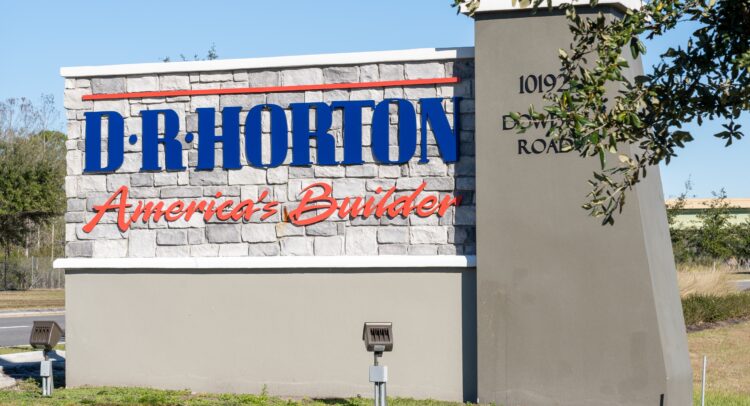D.R. Horton, Inc. (DHI), America’s largest homebuilder, saw its market value plummet by more than 10% in early-morning trading on October 29 after the company disappointed investors with its lackluster guidance for Fiscal 2025. I believe the weakness in D.R. Horton stock is an opportunity for long-term-oriented investors as the company shifts its focus to distributing excess capital to shareholders via dividends and buybacks.
Claim 70% Off TipRanks This Holiday Season
- Unlock hedge-fund level data and powerful investing tools for smarter, sharper decisions
- Stay ahead of the market with the latest news and analysis and maximize your portfolio's potential
As a result, I am bullish on D.R. Horton stock as I believe the company is attractively valued despite short-term affordability challenges faced by Americans.
Fourth-Quarter Earnings Highlight D.R.Horton’s Resilience
A key factor behind my bullish stance for D.R. Horton is the company’s continued ability to deliver reasonable growth amid challenging macroeconomic conditions. During its FY24 fourth quarter, Horton saw its net income decline from $1.5 billion a year ago to $1.3 billion on the back of a 5% decline in consolidated revenue to $10 billion. However, for the full financial year of 2024, Horton reported modest net income growth from $4.7 billion to $4.8 billion, aided by a 4% growth in consolidated revenue amid a 7% increase in homes closed to 89,690.
D.R. Horton achieved this reasonable growth despite the ongoing housing affordability crisis in the U.S. Rising home prices have been a key factor in this crisis. According to Federal Reserve data, the average sales price of a house in the U.S. has surged from $384,600 in Q4 2019 to $501,100 in Q3 2024. Elevated mortgage rates have not helped either. Although rates are off their 20-year high of 7.79% seen in October 2023 to around 6.5% today, there is still a long way to go to reach the magic 5% rate where many homebuyers would feel comfortable.
In addition to the aforementioned reasons, low housing inventory, slow wage growth, and the increased cost of living have also contributed to the affordability crisis in the United States. D.R. Horton’s revenue growth has slowed substantially from more than 36% in Fiscal 2021 to just 4% in 2024, but the company has maintained an impressive pre-tax profit margin of over 17% with a return on equity close to 20% by expanding its target market and managing costs efficiently.
Modest Housing Growth in 2025 Is Good News for Horton
I am encouraged by D.R. Horton’s recent initiatives to help homebuyers amid the ongoing affordability crisis, and I believe modest housing growth in 2025 will help the company grow. According to CoreLogic, home prices in the U.S. will grow just 2% in 2025, a notable decline from around 4.5% this year. This, coupled with continued rate cuts by the Fed, should improve the affordability of homes in the year ahead. In addition, CoreLogic expects home sales to increase 9% in 2025.
According to Lawrence Yun, Chief Economist at the National Association of Realtors, there are several early signs of a recovery in home sales, such as more inventory choices for homebuyers, lower rates, and continued job growth. To make the most of an easing in the affordability crisis, D.R. Horton is focused on bringing more affordable options for consumers, which has positioned the company to thrive in the foreseeable future.
One such initiative is to offer mortgage rate buydowns, which is when borrowers are offered the opportunity to buy a lower interest rate. The company is also focused on building new homes with smaller floor plans to lure new homebuyers, and this strategy has already seen some early success. D.R. Horton’s base price adjustments, expansion into entry-level markets, and renewed focus on rental operations are some of the other strategies deployed by the company to address the affordability crisis.
D.R. Horton Is Emerging as a Wealth Distributor
In addition to the expected earnings growth in the next fiscal year, D.R. Horton’s focus on distributing excess capital to shareholders has buoyed my sentiment toward the company. Horton has maintained a strong balance sheet with a debt-to-capital ratio of around 20%, enabling the company to grow shareholder distributions despite challenging market conditions.
After reporting Q4 earnings, the company raised the quarterly dividend by 33% to $0.40 per share, bringing the forward dividend yield close to 1%.
In addition to dividends, the company has been using share buybacks to return wealth to shareholders by reducing the share count, paving the way for higher earnings per share in the future. D.R. Horton has spent approximately $1.8 billion in stock buybacks in the past 12 months, a notable increase from just $500 million in Fiscal 2019.
Is D.R. Horton a Buy, According to Wall Street Analysts?
The post-earnings stock price decline has created a margin of safety to invest in D.R. Horton. Indeed, based on the ratings of 4 Wall Street analysts, the average D.R. Horton price target is $200, which implies an upside of 21% from the current market price.

D.R. Horton is currently valued at a forward P/E of 12.38 compared to 12.31 for Lennar Corporation (LEN) and 10.32 for Toll Brothers (TOL). This suggests Horton is fairly valued in the market compared to its closest peers. In my opinion, investing in a fairly valued business that is well-positioned to grow modestly while distributing wealth to shareholders is not a bad deal in the current market environment where many companies are expensively valued.
Takeaway
Despite being battered by the housing affordability crisis in the U.S., D.R. Horton managed to grow modestly in Fiscal 2024. The expected improvement in the affordability crisis and the recent strategic initiatives introduced by D.R. Horton should help the company grow in Fiscal 2025 while distributing more wealth to shareholders through dividends and buybacks. The recent weakness in D.R. Horton’s stock price, therefore, presents an opportunity for investors.
















